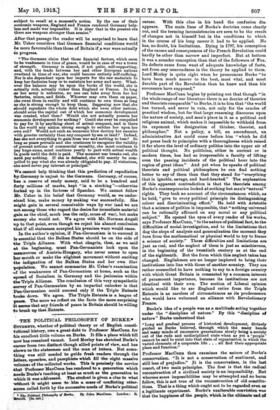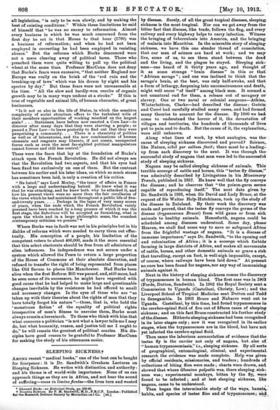THE POLITICAL PHILOSOPHY OF BURKE.* STUDENTS, whether of political theory
or of English consti- tutional history, owe a great debt to Professor MacCunn for Ilia excellent little volume on Burke. It fills a place which till now has remained vacant. Lord Morley has sketched Burke's -career from two distinct though allied points of view, and has shown us the statesman and the man of letters. But some- thing was still needed to guide fresh readers through the letters, speeches, and pamphlets which fill the eight massive volumes of the collected works. This is precisely the service that Professor MacCunn has rendered to a generation which needs Burke's teaching at least as much as the generation to which it was addressed. The student is given a clue to what without it might seem to him a mass of conflicting utter- ances called forth by the successive needs of Burke's political • The Political Philosophy of Burke. By John BfacCunn. London : E. Arnold. [5s. net.]
career. With this clue in his band the confusion disr appears. The main lines of Burke's doctrine come clearly out, and the teeming inconsistencies are seen to be the result of changes not in himself but in the conditions to which in the course of his long career it had to be applied. He has, no doubt, his limitations. Dying in 1797, his conception of the causes and consequences of the French Revolution could hardly be other than narrow and imperfect. But at bottom it was a sounder conception than that of the followers of Fox.
Its defects came from want of adequate knowledge of facts, not from any unsoundness in the theory he applied to them.
Lord Morley is quite right when he pronounces Burke "to have been much nearer to the best, most vital, and most durable part of the Revolution than he knew and than his successors have supposed."
Professor MacCunn begins by pointing out that though " in the whole range of our literature there is no decrier of theories and theorists comparable" to Burke, it is to him that "the world has turned, and never in vain, not only for the oracles of practical wisdom, but for that large reasoning discourse upon the nature of society, and man's place in it as a political and religious animal, which makes it impossible to withhold from its exponent the designation of thinker, theorist, and philosopher." Not a policy, a bill, an amendment, an administrative Act could come before him "which he did not press back to principles with a thoroughness which raised it far above the level of ordinary politics into the upper air of political thought. No politician, either in ancient or in modern times, has had so irrepressible a faculty of lifting even the passing incidents of the political hour into the region of great ideas." And yet when he speaks of political theorists and political philosophers he can find nothing better to say of them than that they stand for "everything that is ignoble, savage, and hard-hearted." The explanation of this apparent contradiction is that the theorists among Burke's contemporaries looked at nothing but man's "natural" rights. They took no account of the circumstances which, as he held, " give to every political principle its distinguishing colour and discriminating effect." He held with Aristotle that a science of politics is impossible, that " nothing universal can be rationally affirmed on any moral or any political subject." He opened the eyes of every reader of his works, says Professor MacCunn, " to the nature of political fact, to the difficulties of social investigation, and to the limitations that dog the steps of analysis and generalization the moment they turn from the mathematical or physical world to try to frame a science of society." These difficulties and limitations are just as real, and the neglect of them is just as mischievous, in the beginning of the twentieth century as at the end of the eighteenth. But the form which this neglect takes has changed. Englishmen are no longer implored to bring their institutions into line with those of another country. They are rather counselled to have nothing to say to a foreign country with which Great Britain is connected by a common interest of paramount importance, because its institutions are not identical with their own. The section of Liberal opinion which would like to see England retire from the Triple Entente is as careless of circumstances as its predecessors who would have welcomed an alliance with Revolutionary France.
Burke's idea of a people was as a multitude acting together under the " discipline of nature." By this "discipline of nature " Burke understood that
"Long and gradual process of historical development, divinely guided as Burke believed, through which the many hands and many minds of successive generations slowly bring a society out of the rude and undisciplined state when as yet a `people' cannot be said to exist into that state of organization in which the varied elements of a corporate life . . . all find their appropriate place and function."
Professor MacCunn then examines the natnre of Burke's conservatism. "It is not a conservatism of sentiment, and
still less of prejudice." It is the conservatism, in the last resort, of two main principles. The first is that the radical reconstruction of a civilized society is-an impossibility. But whereas some impossibilities may be attempted and no harm follow, this is not true of the reconstruction of old constitu- tions. That is a thing which ought not to be regarded even as
a legitimate experiment. Burke's unalterable conviction was that the happiness of the people, which is the ultimate end of
all legislation, " is only to be won slowly, and by making the
best of existing conditions." Within these limitations he said of himself that " he was no enemy to reformation. Almost every business in which he was much concerned from the first day be sat in that House to that hour (1790) was
a business of reformation ; and when he had not been employed in correcting he bad been employed in resisting abuses." But the reforms which Burke denounced were not a mere clearing away of political tares. Those who preached them were quite willing to pull up the political '• wheat at the same time. Professor MacCunn does not deny that Burke's fears were excessive, "that neither England nor Europe was really on the brink of the 'red ruin and the breaking-up of laws' which was his dream by night and his spectre by day." But these fears were not unreasonable at the time. " All the slow and hardly-won results of organic growth may be in many ways undone at a stroke." If this is true of vegetable and animal life, of human character, of great businesses,
"Is it not so also in the life of States, in which the sensitive complexity of social structure offers to the turbulent wills of their members opportunities of working mischief on the largest scale ? . . . Statesmen have before now enacted a Corn Law—to discover after many days that they were starving a people ; or passed a Poor Law—to leave posterity to find out that they were pauperizing a community. . . . There is a chemistry of politics as well as of laboratories, and the new combinations of human elements and reagents may liberate, if not create, unexpected forces such as even the most far-sighted political manipulators cannot foresee and still less control."
These were the fears that lay at the foundation of Burke's attack upon the French Revolution. He did not always see that the Revolution had two,aspects, and that his eyes had
been fixed too exclusively on one of them. But the contrast between his earlier and his later ideas, on which so much stress has sometimes been laid, is only a creation of his critics.
"He hated," says Lord Morley, "the tenor of affairs in France with a large and understanding hatred. He knew what it was that he was attacking, and he knew both why he attacked it, and how his present views were no more than the fair corollaries of the views which he had maintained throughout a public life of five- and-twenty years. . . . Perhaps in the lapse of very many scores of years, when the ends which the French Revolution vainly pursued have been reached by a long process of which it was the first stage, the Reflections will be accepted as furnishing, what is upon the whole and in a large philosophic sense, the soundest contemporary criticism we possess."*
Where Burke was in fault was not in his principles but in his dislike of reforms which were needed to carry them out effec- tually. His conception of a people, his limitation of the competent voters to about 400,000, made it the more essential that this select electorate should be free from all admixture of alien influences. Its independence was not secure under a system which allowed the Peers to return a large proportion of the House of Commons at their absolute discretion, and refused to transfer the right of being represented from places like Old Sarum to places like Manchester. Had Burke been alive when the first Reform Bill was passed, and, still more, had he seen some of its successors, he might have regretted with good cause that he had helped to make large and questionable changes inevitable by the resistance be had offered to small and necessary changes. In the eyes of those who are "so taken up with their theories about the rights of man that they have totally forgot his nature "—those, that is, who hold the 'monstrous fiction' of the equality of political rights irrespective of men's fitness to exercise them, Burke must always remain a heresiarch. To those who think with him that what concerns a politician " is not what a lawyer tells me I may do, but what humanity, reason, and justice tell me I ought to do," he will remain the greatest of political oracles. His dis- ciples have good reason to be grateful to Professor MacCunn for making the study of his utterances easier.











































 Previous page
Previous page